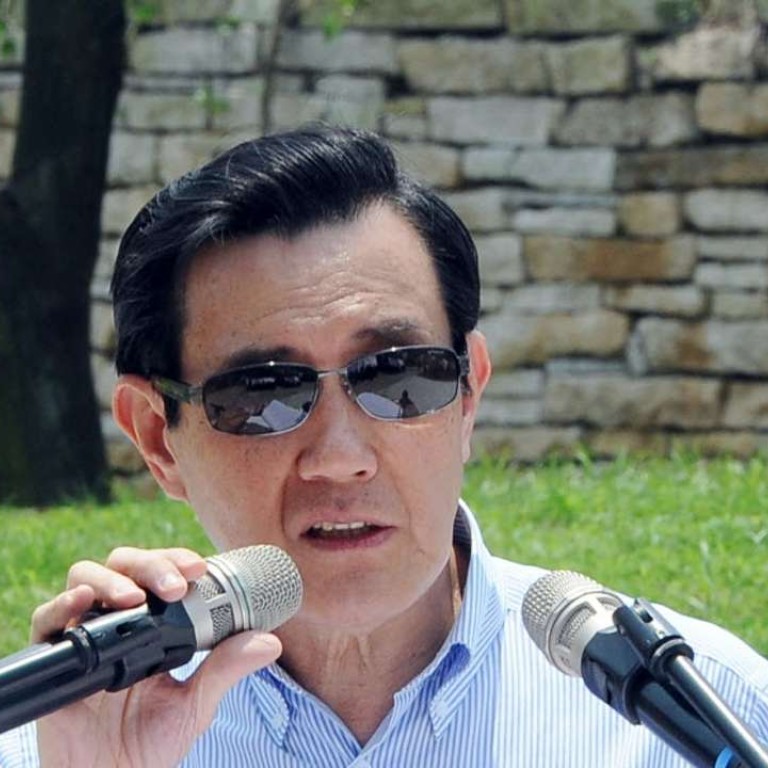
Taiwanese and Japanese vessels arrive in Okinotori for a show of strength
Outgoing Taiwanese President Ma Ying-jeou’s administration hopes to negotiate the maritime territorial dispute, possibly by signing a fisheries pact
Taiwanese and Japanese officials vessels arrived in Japan’s self-declared exclusive economic zone (EEZ) near Okinotori, the southernmost point of Japanese territory, on Friday, Taiwanese officials confirmed, amid rising tensions in the area.
An official from Taiwan’s Coast Guard Administration (CGA), who wished to remain anonymous, said the vessels sent by the Taiwanese and Japanese governments entered the 200-nautical-mile EEZ at around noon.
Taiwan sent a 2,000-tonne coastguard vessel, equipped with 20-millimetre cannonsand water cannon, and a fishing training ship from the Council of Agriculture on Sunday to protect Taiwanese fishing boats conducting fishing activities in Japan’s self-declared EEZ near Okinotori, a group of rocky protrusions located some 1,700km south of Tokyo.
In addition to the two official vessels, the official said the CGA sent a 3,000-tonne armed rescue ship to Okinotori after learning that the Japan Coast Guard sent more vessels there than it did.
“Navy vessels are also ready to protect the coastguard ships if it is necessary,” he said.
The move came after a Taiwanese fishing boat was detained by the Japan Coast Guard on April 24 for illegally fishing in what Japan considers its EEZ near Okinotori.
The boat and its crew were released the following Thursday after a fine of a 6 million yen (HK$434,500) was made to the Japanese side.
After the incident, outgoing President Ma Ying-jeou ordered government agencies to act after chairing two National Security Council meetings.
Besides conveying the Taiwanese government’s position to the Japanese government, the Ma administration hopes to negotiate a solution to the problem, preferably by signing a fisheries pact.
Tsai Ming-yao, secretary general of the Association of East Asian Relations – Taiwan’s Foreign Ministry-linked agency tasked with handling ties with Japan in the absence of formal diplomatic relations – said the Japanese government hoped to handle the matter “in a low-key manner”.
“What it means is that they hope both sides can handle the matter calmly and peacefully,” he said.
Tsai said both sides had conveyed to each other their respective positions and the hope of discussing the issue, while the two sides had not yet come to the point of sitting down and talking about it.
Ma, who met Japanese Prime Minister Shinzo Abe’s younger brother Nobuo Kishi, who is a member of Japan’s House of Councillors, on Friday morning, said the Foreign Ministry would continue to negotiate with the Japanese government on the matter, hoping that both sides could work out a resolution.
“If it doesn’t work out, I hope we can let international mediation or arbitration bodies help us resolve the dispute,” he told Kishi.
Kishi, who attended an event at the Legislative Yuan on Friday, said through a translator during his opening remarks that although Japan and Taiwan are geographically and culturally close to each other, they also have “many problems”.
“Personally I sincerely hope that both sides can work together and find solutions to those problems so the bilateral relationship can become stronger and more solid,” he said.
Mikio Numata, head of the Interchange Association, Tokyo’s de facto mission in Taiwan, told the same event through a translator that although Japan and Taiwan did not have diplomatic ties, it was an undeniable fact that both sides had resolved many problems through the joint efforts of Taiwanese legislators and Japanese parliamentarians.
Numata said the main purpose of his job was to convey the official positions of the Taiwanese and Japanese governments to each other so the two sides can “jointly resolve many complicated issues through close exchanges”.
“I promise you that I will listen to your opinions and convey them to the Japanese government,” he said. “I also hope that you will listen to the opinions of the Japanese government and understand its position.”
Following the incident, some legislators from Ma’s Nationalist Party have demanded the Executive Yuan take tougher action against Japan, including the use of military force.

